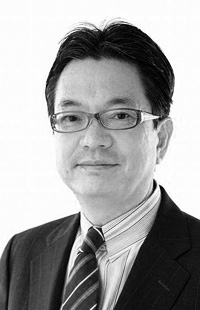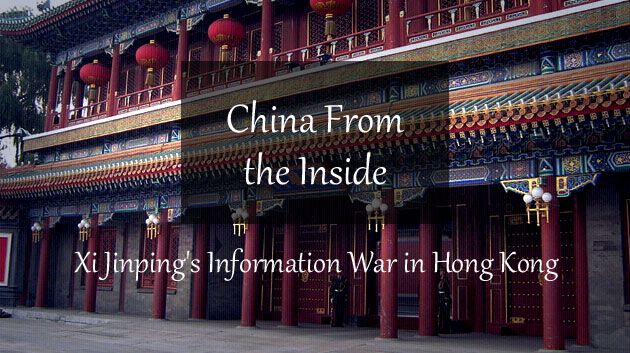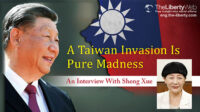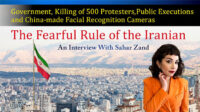Xi Jinping’s Information War in Hong Kong
Masaru Souma's Column on China
Little by little, China is beginning its move towards its ‘global empire’. Masaru Soma, a China expert capable of interpreting the power struggle in the Zhongnanhai, its political centre, provides an insider’s report on the course of China’s international politics. Mr. Soma, a watcher of Xi Jinping, who will become China’s next supreme leader, writes on the current situation influencing China’s top leadership.

Masaru Souma
Born in 1956 in Aomori Prefecture. After graduating with a degree in Chinese from Tokyo University’s Foreign Studies Department, he joined Sankei Newspaper where he held positions that included the head of the Hong Kong branch and the Assistant-Director of the foreign news desk. As a Nieman Fellow, he spent 1998-1999 as an exchange student at Harvard University. He left Sankei Shimbun in 2010, and he currently works as a journalist. He has published many books including Chugoku Kyousantou Ni Kesareta Hitobito (The People Who Disappeared From The Chinese Communist Party) and Xi Jinping No Shoutai (The Real Xi Jinping)3 which he wrote under the pseudonym Kayasawa Izuru. Mr.Souma also penned Shin Koutei – Hu Jintao No Shoutai (The New Emperor – The Real Hu Jintao) (all published by Shogakukan).
During the annual fireworks display in Victoria Harbour in Hong Kong on October 1st, China’s National Day, a rental vessel from the local electricity company collided with a ferry. The disaster involved all of the 124 people aboard. The employees of the power company and their families were thrown into the sea, and 38 lives were lost.
It was intriguing that the Chinese Politburo made an exceptional response to this ‘tragedy on National Day’. President Hu Jintao, Premier Wen Jiabao, and Vice President Xi Jinping, directly contacted Leung Chunying, Chief Executive and President of the Executive Council of Hong Kong, and one by one they instructed him to do his best to respond to the incident and to search for those missing, to provide treatment for the injured, and to make special considerations for the bereaved.
They real aim was to mitigate the anger of Hong Kong citizens, who have been upset by the government’s intervention in the election of the Hong Kong Chief Executive held in March. National Education’, forced on them from the Politburo in order to make the Communist regime happy and to instill patriotism, has also irritated the locals.
Hong Kong regional officials revealed, “In particular, Mr. Xi issued the most instructions in a rapid succession as he was almost certain to be appointed as the next supreme leader in the Party Congress in November”.
On October 2nd, the day after the disaster, the Hong Kong regional government declared at a press conference that October 4th would be established as a ‘Day of Mourning’, that flags on governmental buildings would be flown at half-mast for three days, and also announced that the electricity company would pay out HKD 200,000 (about JPY 2 million) to all of the victims. According to the source mentioned above, Mr. Xi instructed the local government on all of these measures.
The Shadow of Xi Jinping Behind the Performance
This unusual response from the Politburo encouraged officials from the Chinese central government’s liaison office in Hong Kong to take action with regard to the matter. Deputy Director Wang Gang of the liaison office, in his capacity as spokesman for the Politburo, held a press conference together with HK’s Chief Executive Leung on October 2nd at the hospital where the injured were being treated. However, Wang didn’t give the Chief Executive much chance to speak directly to the journalists gathered there, overstepping his role.
The viewers of the television news bombarded the station with complaints such as “Since when has Deputy Director Wang become superior to Chief Executive Leung? Who is Hong Kong’s real leader?”, “Chief Executive Leung was treated like a secretary to Deputy Director Wang” and “Chief Executive Leung was completely ignored”. Mr. Wang said “I just informed the public how seriously the Chinese government has taken the incident and that it has thought about the citizens of Hong Kong”, suggesting that this performance was per the instruction of Mr. Xi.
Hong Kong Police Acquiesced to a Boat’s Departure to Senkaku
Furthermore, as the Hong Kong government officials pointed out, “It was not the only performance in Hong Kong arranged by Mr. Xi”.
On 15th August, members of a civil organization called “Action Committee for Defending the Diaoyu Islands” landed on Diaoyu, part of the Senkaku Islands, and 14 people were arrested. Most of us can still recall that they returned to a welcome reception back in Hong Kong as the ‘Diaoyu Heroes’. Their landing was a catalyst for the large-scale anti-Japanese demonstrations on the mainland of China thereafter.
However, there are many inexplicable aspects regarding their landing plan. The biggest question is why Hong Kong’s maritime police allowed them to depart in the first place.
According to a Committee insider, for the past few years the Hong Kong authorities did not allow them to sail to Senkaku. Some members dared to set sail without permission, but every time they were detained by the maritime police in the waters of Hong Kong, foiling their plans.
Yet, the maritime police didn’t take their normal measures in August, and they eventually allowed them to leave the harbor.
The Hong Kong officials pointed out, “There is no doubt that they were instructed from Beijing to let them depart. And the only person who could have done that is Mr. Xi, the top executive in charge of Hong Kong issues.”
Fostering Momentum For Opposing President Hu’s Continuance in a Military Committee
The news website, highly thought to specialize in Chinese information ‘Boshun’, reported that it is quite likely that Mr. Xi was the person who planned the large-scale anti-Japanese demonstrations.
Mr. Xi was not winning the power struggle against President Hu and others before the Party Congress in November, so, as a Beijing insider pointed out, he ‘used Hong Kong to regain his momentum in the power politics race’.
It is said that Mr. Xi’s plan worked, and that President Hu has been severely criticized by party elders ‘for allowing the Japanese government to nationalize the Senkaku Islands’, and that he is in deep trouble. This is not the only time Hong Kong has been used in power politics.
When I was staying in Hong Kong on September 18th, the Vice President of the Chinese People’s Political Consultative Conference, Dong Jianhua, who once served as Chief Executive of Hong Kong, said in an exclusive interview on CNN, “I have no doubt that Vice President Xi will be elected as the next party general secretary during the Congress”. Furthermore, he revealed, “Without any exclusive information, and just thinking about it given the circumstances, President Hu might stay on the Military Committee.”
As it is extremely rare for a dignitary, who is well connected with the top leadership, to talk to the US media about the most sensitive issues concerning politburo personnel affairs, some regard it as “power politics information manipulation” in Hong Kong (reported by the daily newspaper called the ‘Hong Kong Economic Journal’).
Mr. Dong is closely related to a Shanghai faction, and is a good friend of Mr. Xi. It seems that Mr. Dong’s comment was aimed at boosting the opposition in the Party against President Hu’s continuing on the Military Commission by deliberately revealing this speculation.
The above-mentioned Chinese insider pointed out, “Mr. Xi is taking full advantage of Hong Kong as his base for propaganda in order to win the power struggle.”



















